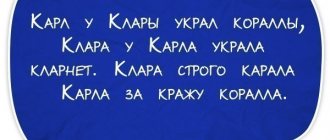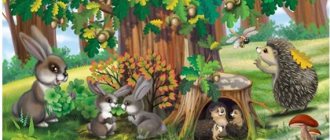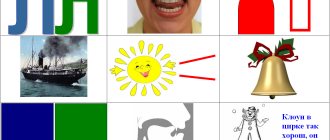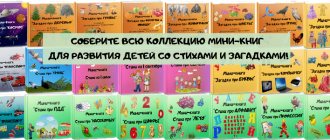Tongue twisters for the sound L:
50 tongue twisters for children's speech development and tasks and games for them.
This article contains tongue twisters for automating the correct pronunciation of the L sound in words and phrases, as well as games and tasks for them.
Tongue twisters have been specially selected for the development of speech in preschool children. In all tongue twisters with the sound L, there is no sound r, which is difficult for children to pronounce, which makes it possible to focus the child’s attention on the sound l and l and their correct articulation during tasks and language games.
How to correctly use tongue twisters for the sound L in the development of speech in preschool children
First rule. The main rule for using tongue twisters in children’s speech development:
The text of the tongue twister that we offer to the child should contain those sounds that the child already knows how to pronounce correctly. In this case, we reinforce the correct pronunciation of the sound l and develop the child’s diction.
If we include in the tongue twister those sounds that the child pronounces incorrectly, then we do not develop the child’s speech, but, on the contrary, we reinforce the incorrect pronunciation of sounds in his speech! Therefore, the correct selection of tongue twisters individually for each child, taking into account the characteristics of his speech development, is so important.
Second rule. An adult carefully observes the child’s pronunciation of the sound L in tongue twisters and corrects the child if necessary.
When a child pronounces a tongue twister, he may make a mistake and begin to pronounce the sound L incorrectly again. In this case, you need to remind him of the correct pronunciation, say the tongue twister more slowly and clearly, syllable by syllable. And then gradually speed up its pace.
Third rule. If ancient words and expressions are found in a tongue twister,
then we clarify their meaning in a conversation with the child. For example, in the tongue twister “The ox fell into the wolf’s den,” you need to talk with the child about:
- who is the ox?
- Is he afraid of the wolf and his lair?
Fourth rule. Tongue twisters are a language game, and a game is always fun and interesting.
This is exactly what we do with tongue twisters with the sound L! The list of tasks and games given below will help you.
Training the sound “s”
Sometimes instead of the whistling sound “s”, children hear the hissing sound “sh”. More often this occurs due to underdevelopment of the speech apparatus, as well as due to birth injuries. You can correct the position by regular training and honing the “s”. There are a number of useful “tonguage tools” for this:
- Sasha sewed shorts for Sveta. Sveta sewed boots for Sasha.
- Senka brought gifts to the family: earrings for his sisters, boots for his brothers.
- They bought a saber for Sasha. Sasha is sitting with a saber and with his neighbor Sasha. They started playing and broke the checker.
- Sasha is perfection and is still improving herself.
- Sasha sewed a hat for Sasha. Sasha hit a bump with his hat.
- I'm tired of asking to mow in the field. Mill all the braids in millet. Posed millet for the piglets. And the piglets ask for more millet.
- A fidgety neighbor has a stay-at-home neighbor. I was going to sit at home with my fidgety neighbor all day with nothing to do, but the fidgety guy didn’t sit for even a second.
These and similar tongue twisters help to pronounce “s” clearly and in all variations.
Options for tasks and games with tongue twisters using the sound L for children
— Game “From Turtle to Rocket”, “Radio” - for a description of the games, see the article
- Find words in the tongue twister with the sound L and with the sound L.
- Find words in a tongue twister in which the sound L (or the sound L) is at the beginning of the word, in the middle of the word, at the end of the word.
- Come up with your own funny sentence with this word (fable - confusion).
- Which word got lost? (The adult replaces the word from the tongue twister with another word that is inappropriate in meaning, the children guess which word got lost and which word needs to be put in the tongue twister).
- Take two words with the sound L from the tongue twister and combine them into one sentence.
- Say a tongue twister cheerfully, sadly, amazed, admiringly, tiredly and with other intonations. You can play “Tell me like me” - the child repeats the intonation, pauses of the host - the adult in pronouncing the tongue twister.
- Guess the intonation with which your playing partner pronounced the tongue twister.
— The correct way to say a tongue twister out loud is first slowly (this is how Tortilla the turtle would say it), then at an average pace (this is how Artemon would say it), then quickly and quickly (this is how Toropyzhka says tongue twisters).
- Catch the ball from the leader and, in response, repeat the tongue twister and throw the ball further either to the leader or to the next child.
Differentiation of sounds R-L. Speech material
Distinguishing the sounds R-L by ear and in pronunciation.
Goal: differentiation of R-L sounds. Objectives: 1. To develop in preschoolers correct sound pronunciation, the ability to differentiate R-L sounds in their speech, and to use them correctly. 2. Using a didactic game, diversify the work on consolidating correct sound pronunciation and interest children. Description: The child mixes the sounds R-L very often, not only by ear, but also in pronunciation.
The work I have described on differentiating R-L sounds helps clearer, more conscious pronunciation in general, and is also the basis of writing literacy. These games can be conducted by both a speech therapist and a teacher. This work will be useful to speech therapists, speech therapists, educators, and parents. Contents
First stage Discrimination of R-L sounds in isolation, in syllables and words.
1. Differentiation of L-R sounds in straight syllables with the same vowel sounds.
The “Repeat” game is to clearly pronounce the syllables (first 2, and then 3 syllables). First, an adult acts as the leader, and then you can invite the child to ask syllables, and other children or the teacher repeat. The task of the child leader is to notice mistakes and correct them. la-ra lo-ro lu-ru ly-ry ra-la ro-lo ru-lu ry-ly la-ra-la lo-ro-lo lu-ru-lu ly-ry-ly ra-la-ra ro -lo-ro ru-lu-ru ry-ly-ry 2. Differentiation of R-L sounds in straight syllables with different vowel sounds. The game “Repeat” is also played on these syllables la-ro lu-ry ly-ra le-ro ru-la ry-lo ra-ly lo-ra-ly lu-ry-la ly-ra-lu le-ro- la ry-lu-ro ro-ly-ru re-lu-ro ra-lu-ry ru-ly-re 3. Differentiation of sounds S-SH in words. Game “Repeat” First, the child is asked to repeat after an adult pairs of similar words that differ only in one sound: rama-lama, lov-drov, spoon-horns, lie-rye, game-needle, varnish-crayfish, rose-vine, hand- Luka, pir-pil, flea-brooch, dump-welding.
You can also use the same words to play the game “Change the Word” - after listening to the first word, you need to mentally replace the sound L in it with R or vice versa.
Game “Memories” - take the pictures that the children named when automating each of the sounds, mix them up and lay out 6 pieces in front of the child. While laying out, the child names each picture. After this, the child remembers all 6 pictures and closes his eyes. The teacher removes the 1st picture, and the child, opening his eyes, must name which picture the teacher took away. First, we take pictures where the words contain only 1 sound. For example, rays-streams-lamp-hand-kennel-shark. Then words with both sounds are taken, such as capercaillie-magazine-marmalade-jumping-fisherman-mirror. Second stage Distinguishing R-L sounds in sentences and coherent speech.
1. Differentiation of R-L sounds in independently composed sentences. Game "Come up with a proposal." This game is played on the material of the same pictures that were discussed earlier. The child is given a picture and asked to come up with a sentence using this word. If you are working with a group of children, you can arrange a competition to see who can come up with the most suggestions. For each sentence made, a chip is given, then the result is calculated. Whoever has more chips wins. 2. Differentiation of R-L sounds in rhymes. The “Repeat” game is to repeat rhymes after the teacher, first slowly and then quickly. Nyura's top is beautiful, but small. Mila is beautiful, blue eyes. The artist drew a llama and put the picture in a frame. Grandfather's name is Luka, his hand hurts. Holding a needle in your hands is not a game. Our Lusha has two pears in her hands. Mosquitoes are small, but evil for the time being. The soap is gray, but the wash is white. Among the white doves there is one gray sparrow. The lumberjacks put their axes on the tables. The clever mole climbed onto the raft. Deftly, I take a saw and use the saw to cut wood. 3. Differentiation of R-L sounds in poetic texts. A fisherman sat on the lawn, Patiently digging for worms, A starling saw the fisherman And said: “A real father! Looks for food even better than me. It’s immediately obvious that it’s a big family!” A snail wants to get into the garden, but the gate prevents it. I'm glad to open the gate, let the snail crawl into the garden. I held the gate for a whole hour - A snail crawls quietly. An old dog in the middle of the yard was guarding a sack of goods, The thieves did not take the sack of goods, The thieves stole the watchman. What have you done, wind? What have you made in the sky? From curly clouds I made fish, cows, elephants. The wind, apparently, did not hear, the wind lost its patience, got angry, ran, and mixed up the clouds. Where are the paintings? Where is the river? There are just clouds in the sky.
We recommend watching:
Didactic game for children 5 - 7 years old Speech therapy leisure in the preparatory group Winter tongue twisters and poems for automating and differentiating sounds Didactic game for preschoolers 4-7 years old
Similar articles:
Tongue twisters for practicing the sounds of the Russian language
Complex tongue twisters for the letters “r” and “l”
To move on to more complex tongue twisters with the letters “r” and “l”, you need to learn how to pronounce easier ones, in one or two lines.
Valery painted the cavalry with watercolors. The quarry cavalry gallops at Valery.
Valya was knitting mittens. Varya was knitting felt boots. We bought Valerika and Varenka mittens and felt boots.
Valerka took the plate, Valerka took the tray. Valerka brought me a plate on a tray.
The fidgety wind tore out the gates like pinwheels, the grumpy raven stole the evening cheesecakes.
The crab made a rake for the crab. He handed the rake the crab to the crab. Crab rakes hay.
Lara planted cucumbers, and then watered them, and then collected them, washed them and pickled them.
Larisa prepared rice soup for Boris. And Boris treated Larisa to Iris.
Praskovya traded the crucian carp for three pairs of striped piglets. The piglets ran through the dew, The piglets caught a cold, but not all of them.
The pig's snout was blunt. I dug up half the yard with my snout, I dug, I dug, I didn’t get all the way to the fence. That's why the sow hare snouts, so that she can dig.
The magpie argued with the crow, chattered, chattered, out-argued the crow.
Forty forty stole peas, Forty crows drove away forty, Forty eagles scared away the crows, Forty cows drove away the eagles.
Avdey was dragging a bag of nails, Proud was dragging a bag of milk mushrooms. Avdey gave nails to Gordey, Gordey gave milk mushrooms to Avdey.
The lop-eared burdock came out into the meadow in the rain, and gathered the wet and chilled passers-by under the leaf into a circle.
The children played together in the orchestra: Karl played the black clarinet, Kirill played the horn, Alla played the harp, and Lara played the piano.
Complex tongue twisters with the letter “l”
Klava deftly chopped onions, Lola washed the floor and shelves, Volodya knocked out the dust, Valya hammered nails, Kolya merrily sawed, Anatoly washed the forks, and little Sveta ate sweet candies.
A white wolf lived in the world, washed his paws clean with soap, was very clean, and howled for a long time without soap.
For some reason there was a blanket on our floor. Alla didn’t even see how it got there: she was sculpting, she was knitting, she was walking on the street. The blanket got bored
Striped rugs Vlas's daughter rinsed. I rinsed and rinsed - the river became striped.
Mila bought a doll and wore it all day. Mila dressed the doll, kissed it, and loved it. She gave the doll a name - she called the doll Galochka. Mila rocked the doll. She sang nicely and nicely: Gala-Gala-Galochka, Here's a jump rope for you, Here's a little box for you, Chocolate and a bun.
Lions wandered in cages, Gazelles galloped, Snails crawled, and foxes ran. And only the animals sighed sleepily, sniffled sweetly, and moaned softly.
Old talkative women live in a hut at the edge of the forest. Every old lady has a basket, There is a cat in every basket, Cats in baskets sew boots for old ladies.
An avalanche of snow slid down from half, slid down from half of a gently sloping mountain. Another half of the snow avalanche lies on the flat mountain for the time being.
Rules for the pronunciation of “linguists”
To achieve maximum results from repeating pure phrases, you must adhere to the following rules:
- You must first pronounce the phrases slowly and clearly.
- If we are talking about a child, he must first explain the meaning of the phrase, since it does not always contain understandable words.
- The second time it’s worth saying the phrase faster.
- The third time, say quickly and repeat again.
- For adults, it is not enough to simply strive to speak quickly. You should also change your expression and intonation. Because diction training also includes expressiveness of speech.
You should always start with short sayings. They are easier to remember and pronounce. There is no point in stopping there. After automating the short “tongue rollers,” you can move on to more complex and longer ones. If short phrases are given with ease and without difficulty, this indicates that you are ready to take new steps towards ideal diction.










